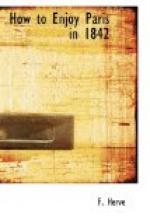Amongst the number of inventions which are constantly emanating from the brain of man, I know of few which unite more ingenuity, utility, and simplicity than that of M. Martin (gun-maker at No. 36, Rue Phelippeaux), relative to the improvement of every description of gun that is impelled by percussion. According to the system he has introduced, and for which he has obtained a patent, all the inconvenience to which the sportsman is subjected in priming is entirely obviated, as instead of having to place the percussion cap with one’s fingers, so disagreeable in very cold weather, it is at once effected by the act of cocking, and the gun may be fired from 80 to 100 times, always as it were priming itself, as the number of percussion caps required are introduced through the butt, and conducted to the point desired. The method of inserting the percussion caps is perfectly easy; pressing a little button or nut at the bottom of the butt causes a plate to open, when two spiral wire-springs must be taken out, as also a moveable tube, from the interior of the gun, and the latter filled with percussion caps, which must be poured into fixed tubes which communicate with the anvil; they may contain from 40 to 50 each; when this number is introduced replace the spiral wire-springs which press the percussion caps exactly, regularly and successively as they are needed to the point desired, then fasten in the springs with the little hook attached for that purpose, lastly replace the moveable tube and shut the plate at the bottom of the butt. This process is executed in a far shorter time than it can be described. The immense advantage of this invention may not appear at the first view; but when it is considered how much more rapid may be the fire of an army in consequence of the time gained, which would be occupied in priming, the power it will give them over an enemy must be evident, and there is no doubt but that in a very short time they will be universally adopted. All such of my countrymen who come to Paris I would recommend to call on M. Martin; he will give them every possible explanation on the subject in the most obliging manner, and also give them practical evidence of the manner in which it operates.
However deficient the French were until a very few years since in almost every thing which relates to mechanics, yet in some articles they have now made such rapid strides, that it becomes a question whether they will not surpass us, if we do not exert the same energy in the spirit of improvement with which they have been recently actuated. Formerly the inferiority of French pianos to ours was most evident, and perhaps, generally speaking, I should still say it was the case, but there are a few manufacturers, the tone of whose instruments is superb; of such a description are those of M. Soufleto. It is really surprising how he has been enabled, in a small upright piano, to produce the force and depth of tone which he has found the




